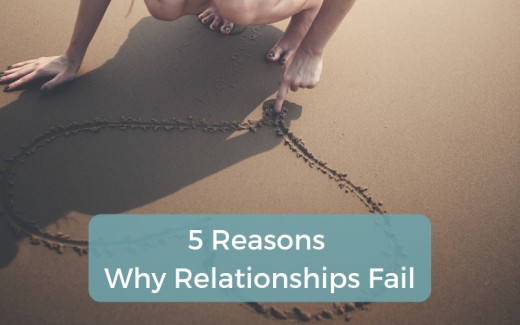5 Reasons Why Relationships Fail

Table of Contents
Relationship Failure
| Causes For Relationship Failure
| 1. Too Many Compromises
|
2. Falling In Love Forever
| 3. Relationship Types
| Secure
|
Anxious
| Avoidant
| Anxious-Avoidant
|
4. Monogamy
| 5. Living Separate Lives
| Always An Opportunity
|
Relationship Failure
The idea that when we first find the right partner, we'll be happy to the end of our days is very tempting. However, the reality is often different. Since 1970, the annual divorce rate, globally has more than doubled.
A relationship is rarely beautiful and often as pleasant as a root canal treatment without anaesthesia. Not that I have ever had a root canal treatment without anaesthesia, but I suppose that it is not pleasant.
I suffer like a dog after each separation, wondering why there is such nonsense as feelings. However, the first weeks and months after a breakup are for many people hell, but even heartbroken will eventually pass. It will.
But if a relationship is unpleasant and we prefer confetti, sunsets and happy endings, why do our relationships fail so often?
I want to give you an answer. To be more precise, there are indeed five answers.

Causes For Relationship Failure
Every relationship is unique and has its own problems.
- Too little sex
- Lack of communication
- Various ideas regarding the wall colour of the guest room
However, these types of differences are often not the cause of the relationship failure, but only the symptoms. The actual causes of relationship failure are often different. Often, not always!
Forthcoming, the five most common reasons for relationship failure.
Indeed, there are also relationship failures which have a completely different cause, but it's entirely possible that one of these five causes is also the reason for your last failure. And if not, you may find out why your best friend's relationship has failed.
1. Too Many Compromises
The most common reason for relationship failure is that our partner doesn't suit us. While every relationship requires compromises, if the differences between two people are too big from the start, there probably won't be a happy ending. And no sunset and no confetti either.
That we relate to people, who are as useful to us as is chocolate sauce to pickles is often because we are emotionally dependent.
We are unable to be alone and need constant confirmation and recognition from a partner to make us feel good. We look for happiness and fulfilment in our partner but overlook the fact that we are responsible for it.
That emotional dependency often causes us to get involved with someone, not to be alone, even though that someone doesn't suit us. That leads to unhealthy relationships and separations.
If we have a relationship with a person who doesn't suit us, there is less of a relationship problem than a selection problem.

2. Falling In Love Forever
The phase of falling in love is a state of emergency of our brain. Being in love is not a feeling, but makes us perceive and diminish other feelings. If we are in love, areas of the brain similar to drug addiction are activated. People can become addicted to being in love.
The period of falling in love usually lasts six months to three years. In this phase, we are very focused on and see our partner as well as the relationship often through pink heart-shaped glasses.
When this romantic state of emergency is over, many people see it as a sign that the relationship is going downhill. But ultimately, the relationship only enters a new phase, in which romantic infatuation gives way to a sense of peace, togetherness, and calm. Being in love gives way to the feeling of love, which is very different.
The reason is that new circuits drive our brain at this stage.
Unfortunately, many people confuse being in love with love and yearn for this emotional state of emergency. If the feeling of being in love is over and it is time to move on to a new relationship phase. They end the relationship and look for the rush of love with the next partner. You could call them love addicts.
A long-term relationship is not a fairytale world full of fragrant roses and iridescent rainbows in which we ride with our partner on a unicorn towards the sunset.
Get over it!!!
3. Relationship Types
The attachment theory came into being in the 1950s. It is a psychological theory that explains why and how we build close relationships with other people.
The attachment theory states that there are different types of relationships and these have a significant influence on which people we are attracted to and with what typical relationship problems we have to fight.
There are four relationship types,
- Secure
- Anxious
- Avoidant
- Anxious-Avoidant
Although nobody wants to be categorised and put in a drawer, after all, we all want to be unique and special. But the attachment theory has now been well researched.
In the following, I would like to explain the four relationship types briefly.

Secure
Those are people who have no problem expressing interest and affection, dealing with separations and allowing closeness. These people can be alone, to draw boundaries and to attribute the right level of meaning to their relationship. Secure relationship types make the best partners.
Anxious
Anxious relationship types need constant acknowledgement and response from their partner. They are often worried about their relationship. They can't be alone, they don't feel comfortable as singles, and they have a hard time trusting others even when these people are close to them. Their behaviour is often completely irrational and very emotional. Women have a tendency to be more anxious than men.
Avoidant
Avoiders are very independent people, and their freedom is essential to them. They often have problems with too much closeness and find excuses not to get involved with someone permanently. Men are more likely to avoid type than women.
Anxious-Avoidant
This type is, so to speak, the worst of two worlds. They are afraid of closeness and attachment, and at the same time, they don't trust anyone who comes closer to them. Only a tiny part of the population is anxious-avoidant, and these people usually have a lot of other emotional problems.
Often, properties of different relationships types define us, with the characteristics of one type most prominent. For example, someone can be 70% of the relationship type Secure, 20% of the Type Anxious and 10% Avoidant.
The Secure relationship type is capable of connecting with the timid as well as the avoiding, often favouring Secure partners. Anxious and avoiding people come to each other more often than timid ones with anxious ones or avoiders with avoiders. On the other hand, anxious-avoiders often have catastrophic relationships with other anxious-avoiders.
Knowing one's relationship type and that of the (ex) partner can shed some light on why the relationship has failed and can help us learn from it. It's a slow and challenging process, but by self-reflection, we can change our relationship type over time.

4. Monogamy
In the Western world, many assume that monogamy corresponds to humans natural relationship. However, according to a growing number of anthropologists and evolutionary researchers, monogamy is a relatively new relationship.
There are many indications that humans have not lived monogamous for tens of thousands of years. Even today, monogamy is far from the only form of relationship, though the most widespread.
Monogamy is normal, but is it natural? Is man by nature more monogamous or polygamous? The answer seems to be somewhere in the middle.
Research suggests that some people are monogamous while others tend to be polyamory. Responsible for these differences are probably different genes and hormones.
There are no differences between the sexes; women are no more polynuclear than men. Scientists have found that up to 10% of fathers are not genetically related to the children they believe are their own.
So it seems that certain people are more monogamous by nature and others are more like, well, enjoy a little more variety.
Many monogamous relationships suffer from infidelities. There are several reasons why people are cheating.
One is, as we have just seen that they are more polyamorous. Another is sexual dissatisfaction. If we are not satisfied with the sex in the relationship, we get elsewhere what we don't get at home. Incidentally, men are no less prone to cheating than women; cheating affects both sexes equally.
Frequently, adulteries are hushed or tacitly accepted, everything appears to be fine. It's certainly far from easy to address this piquant topic, but in my opinion, there are more mature alternatives than sweeping issues under the relationship carpet.
First, we can clarify if our partner is missing something sexually in the relationship. Yet, many different relationship models represent an alternative to a monogamous relationship.
A non-monogamous relationship does not have to mean that we jump into bed with everyone. Even in open relationships, there are often rules.

5. Living Separate Lives
RNo matter how well our partner initially matched us, we then develop in different directions, and the personal differences become too big, that can lead to relationship failure. Love overcomes many things, but not everything.
We are not always aware, and sometimes we want to avoid it, but we humans change over time. Heraclitus of Ephesus also known as the Weeping Philosopher said as early as 500 BC,
The only constant in the universe is change
The experiences we have, the people we meet and, above all, the problems and challenges we face, make us develop and change. Over time, our goals, values, beliefs and interests may vary and may no longer be compatible with those of the partner and the relationship.
Perhaps a woman in her mid-forties realises that she has sacrificed herself to others all her life and decides to pay more attention to her own needs and desires.
Of course, this tremendous personal change also has consequences for the relationship. The husband will find the new behaviour of his wife strange, alien or even selfless and selfish.
The awareness jump of this woman has two possible consequences.
The man understands the personal development and growth of his wife and supports them. He as well as the relationship continue to evolve. There are confetti, sunset and happy endings.
The man doesn't understand the development of his wife. He wants everything to stay the same, which is no longer possible. The relationship will probably fail.
Often it is difficult to decide what compromises we are willing to make for a relationship. Unfortunately, unlike the advertising industry, we, sadly, can not have everything.
No matter which direction we go, sooner or later we will most likely reach a point in the relationship where we have to give up something that is important to us.
What you are willing to give up for a relationship, you have to decide for yourself. But even if we should be ready to compromise in a relationship, we must never violate our integrity for a relationship. It is therefore essential to find the delicate balance between the willingness to compromise and the preservation of personal integrity.
Always An Opportunity
With all the pain and grief that a relationship brings with it, there is also a chance for development. Looking more closely at our past relationship, we can learn a lot from it, about ourselves and our behaviour.
Instead of cursing our ex-partner and referring to as a "selfish type" or "stupid," we should evaluate what we did wrong and what we can do better next time. Yes, that means taking responsibility for one's life. Grow up.
Maybe we should start not to look for so much appreciation and confirmation in our partner.
Perhaps we should reconsider our concept of love and relationship.
We could even consider what relationship type we are and whether we want to change.
Maybe we should recognise that monogamy doesn't seem to work for us.
Or maybe we should realise that in a relationship we should also compromise and eventually have to do without something.
Ultimately, I see the topic of dating and relationship like this,
We Attract What We Are
If we are satisfied, independent, responsible and emotionally healthy, we also attract such partners. Are we dissatisfied, addicted, take no responsibility and are an emotional wreck, then we invite - well, you know the answer!
Hence we should start working on our own emotional life, communicating openly and honestly and learning to set boundaries.
Then we will also attract the right partner, and there will be confetti, sunsets and happy endings.

© 2019 Danyel








